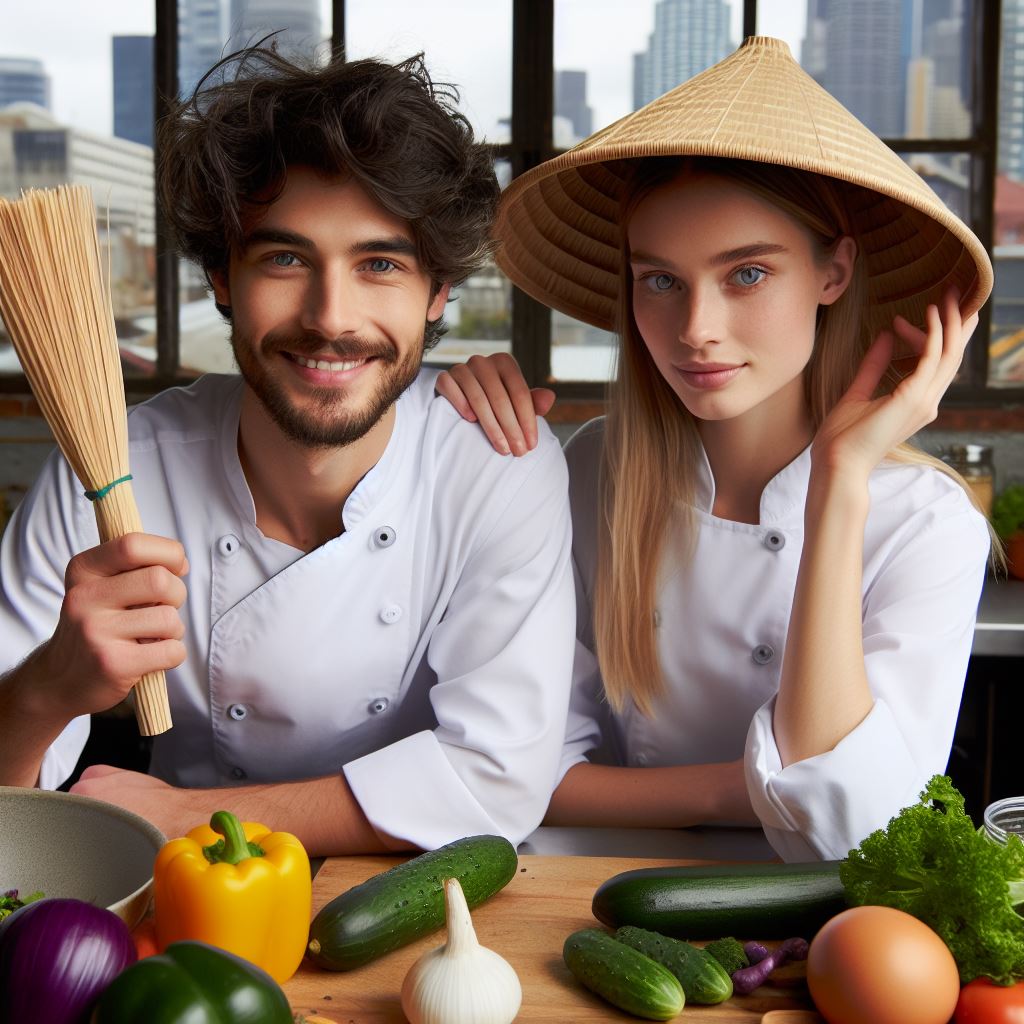Introduction
In the culinary industry, it is important to understand the distinctions between a cook and a chef in Australia.
This blog post will delve into the roles of a cook and a chef, highlighting their significance and providing an overview of the post’s structure.
Understanding the differences between a cook and a chef is crucial in this industry.
While both contribute to food preparation, their roles and responsibilities vary significantly.
By grasping these distinctions, aspiring culinary professionals can make informed career choices.
This blog post will first explore the role of a cook, discussing their tasks in the kitchen and the skills required.
It will then delve into the role of a chef, emphasizing their leadership responsibilities and culinary expertise.
Next, the post will underline the importance of culinary education and training for both cooks and chefs.
It will discuss the various pathways available to aspiring professionals and the benefits of formal culinary education or apprenticeships.
Furthermore, the post will touch on the career progression opportunities for cooks and chefs.
It will highlight the potential for growth and advancement in the culinary industry.
The blog post will conclude by summarizing the key takeaways and reiterating the significance of understanding the roles of cooks and chefs in Australia’s culinary industry.
By gaining insight into these distinctions, individuals can make informed decisions about their culinary careers and pursue the right path for their aspirations.
Definition and Terminology
Definition of a Cook and a Chef
- A cook is a person who prepares food using basic culinary skills and recipes.
- A chef, on the other hand, is a professional who has advanced culinary training and expertise.
Key Differences in Roles, Skills, and Responsibilities
- Cooks typically work under the guidance of a chef and assist in food preparation and cooking.
- Chefs have a higher level of responsibility, overseeing the kitchen, creating menus, and managing staff.
- Chefs focus on creativity and innovation, while cooks follow recipes and established procedures.
- Chefs are trained in a wide range of culinary techniques and have a deeper understanding of flavors and presentation.
Interchangeable Usage of Cook and Chef
- In some instances, the terms cook and chef are used interchangeably, leading to confusion.
- In casual conversations or non-professional settings, people may refer to both cooks and chefs as “chefs.”
- This interchangeable usage can make it difficult to differentiate between the two roles accurately.
Why the Confusion Exists
- The rising popularity of cooking shows and celebrity chefs has contributed to the confusion in terminology.
- The media often refers to all cooking professionals as “chefs,” regardless of their actual qualifications.
- Some restaurants or food establishments use the term “chef” even for individuals performing cook’s duties.
Importance of Recognizing the Differences
- Understanding the roles and distinctions is crucial for both professionals and consumers.
- For aspiring culinary professionals, knowing the difference helps in setting career goals and expectations.
- Consumers can make more informed choices when dining out or hiring catering services.
In essence, while both cooks and chefs play essential roles in the culinary industry, there are notable differences in their skills, responsibilities, and qualifications.
Recognizing these distinctions is vital to avoid confusion and accurately understand the roles of individuals in professional kitchens
Cook’s Role in Australia
A cook plays a crucial role in the Australian culinary industry. They are responsible for preparing, cooking, and presenting food to customers in different types of food establishments such as restaurants, cafes, and catering services.
Specific tasks and responsibilities of a cook in different types of food establishments
- In restaurants, cooks are in charge of the overall preparation and cooking of meals, following specific recipes and guidelines.
- Cooks in cafes usually handle a wide range of tasks, including preparing sandwiches, salads, and light meals, as well as making coffee and other beverages.
- In catering services, cooks are responsible for planning menus, preparing food for large events, and ensuring food quality and presentation.
Required qualifications and certifications for being a cook
- In Australia, there are no specific educational requirements to become a cook. However, a formal qualification such as a Certificate III in Commercial Cookery is preferred by employers.
- Many cooks also gain experience through apprenticeships or on-the-job training, which can lead to higher job prospects.
- Food safety training and certifications, such as a Food Safety Supervisor certificate, are crucial for cooks to ensure they adhere to health and safety regulations.
Career prospects and growth opportunities for cooks in Australia
- The demand for skilled cooks in Australia is high, and there are numerous job opportunities available in the culinary industry.
- Cooks can start their careers in entry-level positions and gradually progress to higher positions based on their skills and experience.
- With experience and additional qualifications, cooks can become head chefs, sous chefs, or kitchen managers in restaurants and hotels.
- There are also opportunities for cooks to work in overseas establishments or even start their own food businesses.
In fact, the role of a cook in the Australian culinary industry is vital, and they have diverse responsibilities across different food establishments.
While formal qualifications are not mandatory, obtaining relevant certifications and gaining experience can significantly enhance career prospects and open up growth opportunities in this field.
Chef’s Role in Australia
In the Australian culinary industry, a chef plays a crucial role in the day-to-day operations of a professional kitchen.
Their responsibilities go beyond simply cooking food. They are the leaders, creators, and innovators who bring culinary experiences to life.
Higher-level Responsibilities
- A chef in Australia is responsible for overseeing the entire kitchen operation.
- They develop menus, create new dishes, and ensure that the food served meets high standards of taste and presentation.
- Collaborating with suppliers to source fresh and quality ingredients is also part of their role.
Creative Aspects
- Chefs have the opportunity to showcase their creativity through experimenting with flavors and presenting dishes attractively.
- They are constantly striving to create unique and memorable dining experiences.
- Chefs often bring their personal style and signature techniques to their culinary creations.
Leadership Skills
- Effective leadership is an essential skill for a chef in Australia.
- They must lead a team of kitchen staff, ensuring smooth operations, communication, and coordination.
- Chefs provide guidance, mentorship, and training to junior chefs and kitchen personnel.
Positions within a Professional Kitchen Hierarchy
- Sous Chef: The second in command who supervises the kitchen in the absence of the head chef.
- Executive Chef: The top chef responsible for the overall culinary vision and management of the kitchen.
- Pastry Chef: Specializes in creating delectable pastries, desserts, and baked goods.
- Line Cook: Responsible for preparing specific dishes or working in a specific kitchen station.
Educational Pathways and Qualifications
- To become a chef in Australia, aspiring individuals can pursue vocational training or higher education.
- Apprenticeships, certificates, diplomas, and degrees in culinary arts or hospitality management are available.
- Completing an apprenticeship provides hands-on experience and a recognized qualification.
- Some chefs also choose to gain international experience through culinary exchange programs.
A chef in Australia has a multifaceted role. They are responsible for overseeing kitchen operations, implementing creative ideas, displaying leadership skills, and contributing to the overall success of the culinary experience.
Pursuing the right educational pathways and acquiring qualifications are essential steps to becoming a skilled and respected chef in Australia.
Read: Navigating COVID-19: Travel Agents’ Advice

Training and Education
When it comes to the training and education required for a cook and a chef, there are some key differences.
Comparison of Training and Education
A cook typically undergoes formal vocational training, which can be completed in as little as six months. They learn fundamental cooking techniques and focus on practical skills.
On the other hand, a chef usually pursues higher education, such as a diploma or degree in culinary arts or hospitality management. This program can take several years to complete, providing a more comprehensive education.
Both roles require a strong foundation in food preparation and safety, but chefs also study management, menu planning, and advanced culinary techniques.
Culinary Programs, Courses, and Apprenticeships
Australia offers a wide range of culinary programs, courses, and apprenticeships to meet the diverse needs of aspiring cooks and chefs.
For cooks, vocational training programs, like Certificate III in Commercial Cookery, are popular options. These programs cover basic culinary skills, food safety, and workplace practices.
Chefs often choose diploma or degree programs, such as Advanced Diploma of Hospitality Management or Bachelor of Culinary Arts. These comprehensive courses provide in-depth knowledge of culinary arts and management principles.
In addition to formal education, apprenticeships and on-the-job training are essential for both cooks and chefs. These programs allow aspiring professionals to gain practical experience and work alongside industry experts.
Your Personalized Career Strategy
Unlock your potential with tailored career consulting. Get clear, actionable steps designed for your success. Start now!
Get StartedImportance of Continuous Learning and Professional Development
Continuous learning and professional development are crucial for cooks and chefs in Australia, regardless of their level of experience.
Culinary trends and techniques are constantly evolving, and staying updated is essential to remain competitive in the industry.
Both cooks and chefs can benefit from attending workshops, seminars, and industry conferences to learn about the latest trends and innovations.
In addition, pursuing specialized courses and certifications, like pastry arts or international cuisine, can enhance their skills and broaden their career opportunities.
To keep up with the changing industry standards and customer preferences, ongoing learning is necessary. Chefs are often required to complete continuing education credits to maintain their professional certifications.
Continuous learning not only helps cooks and chefs keep their skills sharp but also enables them to inspire their teams and bring creativity to their culinary creations.
Generally, the training and education for cooks and chefs in Australia involve different paths. Cooks typically undertake vocational training, while chefs pursue higher education.
Various culinary programs, courses, and apprenticeships are available to aspiring professionals. Continuous learning and professional development are essential for both roles.
By embracing lifelong learning, cooks and chefs can excel in their careers and stay at the forefront of the culinary industry.
Read: Travel Insurance Tips from Expert Agents
Explore Further: Innovations in Australian Hotel Management
Learn More: Sourcing Local: Cooks’ Guide in Australia
Salary and Income Potential
When it comes to salary and income potential, there are significant differences between cooks and chefs in Australia.
Salary Range for Cooks in Australia
For cooks in Australia, the salary range typically falls between $45,000 to $60,000 per year.
Factors that Affect a Cook’s Income Potential:
- Experience: Cooks with more experience often earn higher salaries.
- Skills: Specialized culinary skills can also lead to higher earning potential.
- Location: The location of the restaurant or establishment can impact salary as well.
Salary Range for Chefs in Australia
Contrasting the salary range for chefs in Australia, it is generally higher compared to cooks.
Stand Out with a Resume That Gets Results
Your career is worth more than a generic template. Let us craft a resume and cover letter that showcase your unique strengths and help you secure that dream job.
Get HiredExplain How Career Progression Can Significantly Impact a Chef’s Income:
- Chefs who have worked their way up through the ranks can command higher salaries.
- By gaining experience and demonstrating leadership skills, chefs can reach executive positions with higher pay.
- Achieving recognition through awards and accolades can also boost income potential.
Essentially, when it comes to salary and income potential, chefs generally earn more than cooks in Australia. However, both cooks and chefs can increase their earning potential with experience, skills, and career progression.
It is important for individuals in the culinary industry to continually improve their skills and seek opportunities for growth to enhance their income potential.
Read: Top 10 Destinations Aussie Agents Love
Workplace Dynamics
The work environment and conditions commonly experienced by cooks and chefs
When it comes to workplace dynamics, cooks and chefs in Australia experience different work environments and conditions.
For cooks, the work environment is usually fast-paced and highly demanding. They often work in small, compact kitchens, with limited space and equipment. This can create a cramped and chaotic work atmosphere.
Chefs, on the other hand, typically work in larger kitchens that are equipped with state-of-the-art appliances and have ample space for food preparation. The work environment for chefs is more organized and efficient.
Cooks often work long and irregular hours, including weekends and holidays. They may have to start their shifts early in the morning and work late into the night. This can result in a lack of work-life balance and high stress levels.
The differences in work schedules, hours, and stress levels between the two roles
On the contrary, chefs generally have more regular work schedules and may have the luxury of working during standard business hours.
This allows them to have a better work-life balance and more predictable hours.
Stress levels in the kitchen can be high for both cooks and chefs. Cooks may experience more pressure due to the fast-paced nature of their work, the need to multitask, and the constant demand for timely food preparation.
The importance of teamwork, communication, and collaboration within a kitchen setting
Communication, teamwork, and collaboration are essential within a kitchen setting. Cooks and chefs need to work together cohesively to ensure smooth operations in the kitchen.
Cooks rely heavily on effective communication with chefs and other members of the kitchen staff to understand orders, coordinate food preparation, and maintain quality standards.
Chefs, as the leaders of the kitchen, are responsible for delegating tasks, providing guidance and instructions, and fostering a collaborative work environment.
Both cooks and chefs must be able to work well under pressure and handle stressful situations with professionalism. Time management and efficient teamwork are critical in meeting customer expectations and delivering high-quality meals.
Chefs, on the other hand, enjoy more organized work environments, regular schedules, and better work-life balance.
Transform Your LinkedIn for Maximum Impact
Elevate your professional brand with a LinkedIn profile that attracts recruiters, showcases your expertise, and maximizes opportunities. Stand out in your industry with a profile built for success.
Boost ProfileEffective teamwork, communication, and collaboration are crucial for success in both roles.
Read: Why Use a Travel Agent for Business Trips?
Discover More: Best Aussie Venues for Corporate Events 2024
Conclusion
We’ve delved into the nuances of culinary roles in Australia, distinguishing between cooks and chefs.
Understanding these distinctions is crucial as it informs career choices and aspirations within the culinary industry.
Whether you aspire to master the art of cooking as a skilled cook or aim to ascend to the esteemed title of chef, it’s essential to align your path with your interests and goals.
Explore the diverse career opportunities available, from honing your craft as a cook in bustling kitchens to leading culinary teams as a chef in prestigious establishments.
In short, the work environment, work schedules, hours, and stress levels differ between cooks and chefs in Australia. Cooks often face challenging conditions in compact kitchens, work irregular hours, and experience higher stress levels.
By recognizing the unique roles and responsibilities of cooks and chefs, you can embark on a fulfilling journey tailored to your passions and ambitions, carving out a rewarding career path in Australia’s dynamic culinary landscape.




